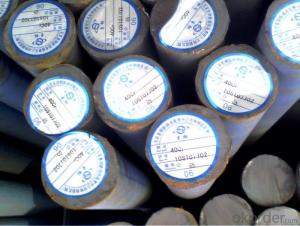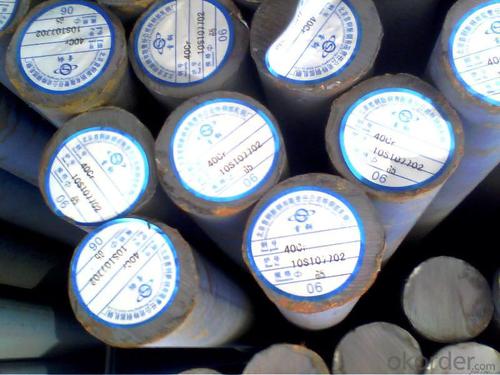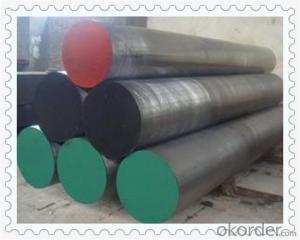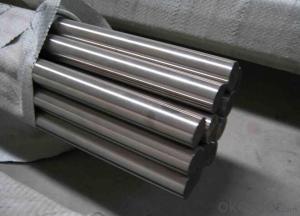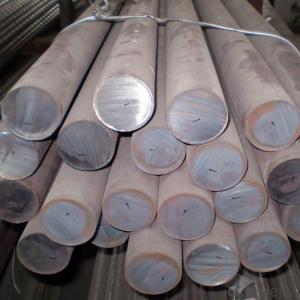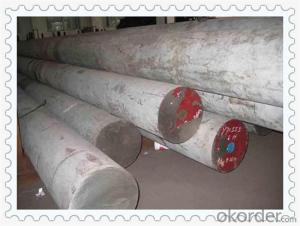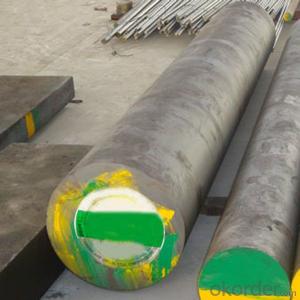20MnCr5 42CrMo4 4340 Alloy Steel Round Bar
- Loading Port:
- China main port
- Payment Terms:
- TT OR LC
- Min Order Qty:
- 30 m.t.
- Supply Capability:
- 10000 m.t./month
OKorder Service Pledge
OKorder Financial Service
You Might Also Like
Specification
20MnCr5 42CrMo4 4340 Alloy Steel Round Bar
Product Information:
1.Grade: 20MnCr5 42CrMo4 4340
2.Dia:12-300mm
3.Length:3-12m
4.Hot rolled
5.MOQ: 30mt per size
Product Overviews:
| Product Name | Typical Grades | Diameter(mm) | Standard adopted |
| Carbon Steel | 20 (1020/S20C/C22) | Ø16-Ø300 | GB/SAE/JIS/DIN |
| 40 (1040/S40C/C40) | |||
| 45 (1045/S45C/C45) | |||
| Bearing Steel | GCr9 (51100/SUJ1) | Ø12-Ø250 | |
| GCr15 (52100/SUJ2/100Gr6) | |||
| GCr9SiMn (A485-Gr.1/SUJ3) | |||
| Cr-Mo Steel | 20Cr (5120/SCr420H/20Cr4) | Ø12-Ø250 | |
| 40Cr (5140/SCr440/41Cr4) | |||
| 42CrMo(4140/SCM440/42CrMo4) | |||
| Gear Steel | 20CrNiMo | Ø16-Ø600 | |
| 20CrMn(5115/SMnC420/20MnCr5) | |||
| 20CrNiMo(8620/SNCM220/20CrMiMo2) |
Product Show:

Our Advantages:
· Industry experience over 20 years.
· Shipment of goods -More than 70 countries worldwide.
· The most convenient transport and prompt delivery.
· Competitive price with best service.
· High technical production line with top quality products.
· High reputation based on best quality products.
With our experienced, enthusiastic and dynamic staffs, we assure to bring you the products with best quality, reasonable prices and good after-sales services under the motto: Friends First, Business After.
Communication, Experience, Expertise and Best efforts are our Promises to you.
- Q: How does silicon affect the characteristics of special steel?
- Silicon plays a crucial role in modifying the characteristics of special steel. When silicon is added to steel in controlled amounts, it enhances several important properties. Firstly, silicon improves the strength and hardness of steel, making it more durable and resistant to wear and tear. This is especially important in applications where the steel is subjected to high levels of stress or needs to withstand extreme conditions. Moreover, silicon also contributes to the heat resistance of special steel. It helps stabilize the steel's microstructure at elevated temperatures, which prevents the material from losing its strength and shape under heat exposure. This makes silicon-infused special steel highly suitable for use in high-temperature environments, such as in furnaces, power plants, and automotive engines. Additionally, silicon promotes the formation of a protective oxide layer on the surface of steel, which enhances its resistance to corrosion. This makes silicon-influenced special steel highly resistant to rust and other forms of degradation caused by exposure to moisture or chemicals. As a result, it is widely used in applications where corrosion resistance is critical, such as in marine environments or chemical processing equipment. Furthermore, silicon also improves the machinability of special steel, making it easier to shape and process. It enhances the steel's cutting and drilling properties, reducing tool wear and increasing production efficiency. This benefit is particularly valuable in manufacturing industries that rely on precise and efficient machining operations. In summary, the addition of silicon to special steel significantly impacts its characteristics. It enhances strength, hardness, heat resistance, corrosion resistance, and machinability, making silicon-influenced special steel highly versatile and well-suited for a wide range of demanding applications.
- Q: Can special steel be used in the electronics industry?
- Yes, special steel can be used in the electronics industry. It is often utilized for manufacturing various components and tools in electronic devices due to its desirable properties such as high strength, corrosion resistance, and thermal conductivity.
- Q: What are the requirements for special steel used in corrosive environments?
- The requirements for special steel used in corrosive environments include high resistance to corrosion, especially against specific corrosive agents such as acids, alkalis, or saline solutions. The steel should possess a strong passive film formation ability, preventing further corrosion. It should also have good mechanical properties, including high strength and toughness, to withstand the harsh conditions. Additionally, the steel must possess good welding and fabrication characteristics, as well as be cost-effective and readily available.
- Q: What are the different methods for improving the toughness of special steel?
- There are several methods for improving the toughness of special steel. One method is through heat treatment, which involves processes such as quenching and tempering to enhance the steel's microstructure and increase its toughness. Another method is alloying, where specific elements are added to the steel composition to improve its toughness properties. Additionally, techniques like grain refinement and controlled rolling can also be employed to enhance the toughness of special steel.
- Q: How are aluminum alloys used in the automotive industry?
- Aluminum alloys are extensively used in the automotive industry due to their lightweight, high strength, and corrosion-resistant properties. These alloys are commonly utilized in the manufacturing of various components, such as engine blocks, cylinder heads, wheels, and body panels. By incorporating aluminum alloys, vehicles can achieve improved fuel efficiency, better performance, and enhanced safety while reducing overall weight and emissions.
- Q: What are the advantages of using special steel in specific applications?
- There are several advantages of using special steel in specific applications. Firstly, special steel offers enhanced strength and durability compared to regular steel. It has higher tensile strength and better resistance to wear and tear, making it ideal for applications where high strength is required, such as in construction, automotive, and aerospace industries. This ensures that the components made from special steel can withstand heavy loads, extreme temperatures, and harsh operating conditions without deformation or failure. Secondly, special steel has excellent corrosion resistance properties. It can resist the effects of moisture, chemicals, and other corrosive elements, making it suitable for applications in marine environments, chemical processing plants, and offshore structures. Special steel can maintain its integrity and structural stability even when exposed to aggressive substances, thereby extending the lifespan of the equipment and reducing maintenance costs. Another advantage of using special steel is its versatility. It can be easily customized and tailored to meet specific requirements of different applications. Special steel can be engineered to have specific mechanical properties, such as hardness, toughness, or flexibility, depending on the desired application. This allows for greater adaptability and enables designers and engineers to create components that are optimized for their intended use. Furthermore, special steel often exhibits excellent heat resistance capabilities. It can withstand high temperatures without losing its mechanical properties, making it suitable for applications involving extreme heat, such as in the manufacturing of industrial furnaces, turbines, and engines. This heat resistance also allows the steel to retain its strength and shape, minimizing the risk of deformation or failure under elevated temperatures. Lastly, special steel offers superior machinability and weldability. It can be easily formed, cut, and welded into complex shapes and structures, allowing for efficient manufacturing processes and reducing production costs. Special steel's machinability also ensures accurate and precise fabrication, resulting in high-quality components that meet strict industry standards. In conclusion, the advantages of using special steel in specific applications include enhanced strength, durability, corrosion resistance, versatility, heat resistance, and excellent machinability. These properties make special steel a preferred choice for various industries, where reliability, performance, and longevity are paramount.
- Q: How does special steel contribute to improving product performance in corrosive environments?
- Special steel contributes to improving product performance in corrosive environments due to its exceptional corrosion resistance properties. It is specifically designed to withstand exposure to harsh chemicals, moisture, and other corrosive elements, thus preventing the degradation and deterioration of the product. By using special steel, manufacturers can ensure longer product lifespans, increased durability, and reduced maintenance costs, ultimately leading to improved performance and customer satisfaction in corrosive environments.
- Q: What are the main characteristics of pressure vessel steel forgings?
- Pressure vessel steel forgings have several main characteristics that make them suitable for use in pressure vessels. Firstly, pressure vessel steel forgings are known for their high strength and toughness. This is crucial as pressure vessels are typically subject to high levels of internal pressure, and the steel must be able to withstand this without deforming or rupturing. The forgings are carefully designed and manufactured to ensure they have the necessary strength and toughness to withstand these pressures. Secondly, pressure vessel steel forgings have excellent resistance to corrosion. As pressure vessels often contain fluids or gases that can be corrosive, it is important that the steel used in their construction is resistant to corrosion. This helps to ensure the longevity and reliability of the pressure vessel. The steel forgings are often made with specific alloying elements that enhance their corrosion resistance. Another important characteristic of pressure vessel steel forgings is their ability to maintain their mechanical properties at high temperatures. Pressure vessels may be subjected to elevated temperatures due to the nature of the process or fluid they are containing. The forgings are designed to retain their strength and toughness even under these high-temperature conditions, ensuring the safety and reliability of the pressure vessel. Furthermore, pressure vessel steel forgings are typically manufactured with strict quality control measures in place. This is necessary to ensure that the forgings meet the required standards and specifications for pressure vessel applications. The manufacturing process includes thorough inspections, testing, and documentation to ensure that the forgings meet the necessary quality and safety requirements. Overall, the main characteristics of pressure vessel steel forgings include high strength and toughness, excellent corrosion resistance, the ability to withstand high temperatures, and strict quality control measures. These characteristics make pressure vessel steel forgings ideal for use in pressure vessels, providing the necessary strength, reliability, and safety required in such applications.
- Q: How does special steel contribute to the manufacturing of valves and pumps?
- Special steel plays a crucial role in the manufacturing of valves and pumps. Its exceptional properties such as high strength, corrosion resistance, and heat resistance make it an ideal material choice. Special steel ensures the durability and reliability of valves and pumps, enabling them to withstand harsh conditions, high pressure, and extreme temperatures. Additionally, the precise composition and mechanical properties of special steel allow for efficient fluid flow control and efficient energy transfer in valves and pumps, enhancing their overall performance.
- Q: What are the different methods of non-destructive testing for special steel?
- There are several methods of non-destructive testing (NDT) that can be used to evaluate the quality and integrity of special steel without causing any damage. These methods include: 1. Ultrasonic Testing (UT): This method uses high-frequency sound waves to detect defects, such as cracks or voids, within the special steel. A transducer is used to emit sound waves into the material, and the reflections or echoes are analyzed to identify any anomalies. 2. Magnetic Particle Testing (MT): This technique is based on the principle of magnetic fields and is primarily used to detect surface or near-surface defects in special steel. A magnetic field is induced in the material, and magnetic particles are applied. Any discontinuities or defects will cause the particles to gather, forming visible indications. 3. Liquid Penetrant Testing (PT): This method involves applying a liquid dye or penetrant to the surface of the special steel. The penetrant is drawn into any surface defects through capillary action. After a certain period, excess penetrant is removed, and a developer is applied to make the indications visible. 4. Radiographic Testing (RT): This technique utilizes X-rays or gamma rays to inspect the internal structure of special steel. The material is exposed to radiation, and a film or digital detector captures the transmitted radiation. Any inconsistencies or defects within the material will be visible on the resulting image. 5. Eddy Current Testing (ECT): ECT is mainly used for detecting surface or near-surface defects in special steel. It works by inducing an alternating current into a coil, creating an electromagnetic field. Any variations in the material's electrical conductivity or magnetic permeability caused by defects will generate changes in the coil's impedance, which can be analyzed. 6. Visual Testing (VT): Although not a direct NDT method, visual inspection is often used as a preliminary step to identify surface defects or irregularities in special steel. This method involves a thorough visual examination of the material using appropriate lighting and magnification tools. These different methods of non-destructive testing for special steel provide valuable insights into the material's quality, helping ensure its structural integrity and reliability in various applications. The choice of method depends on factors such as the type of defect being sought, the location of the material, and the specific requirements of the industry or application involved.
Send your message to us
20MnCr5 42CrMo4 4340 Alloy Steel Round Bar
- Loading Port:
- China main port
- Payment Terms:
- TT OR LC
- Min Order Qty:
- 30 m.t.
- Supply Capability:
- 10000 m.t./month
OKorder Service Pledge
OKorder Financial Service
Similar products
Hot products
Hot Searches
Related keywords
